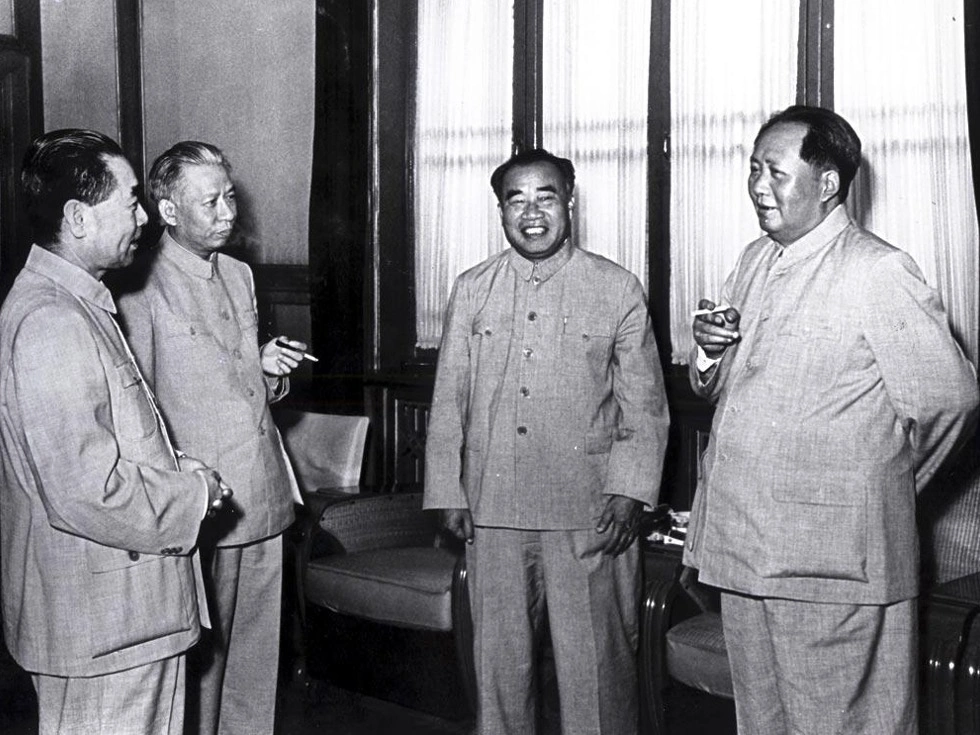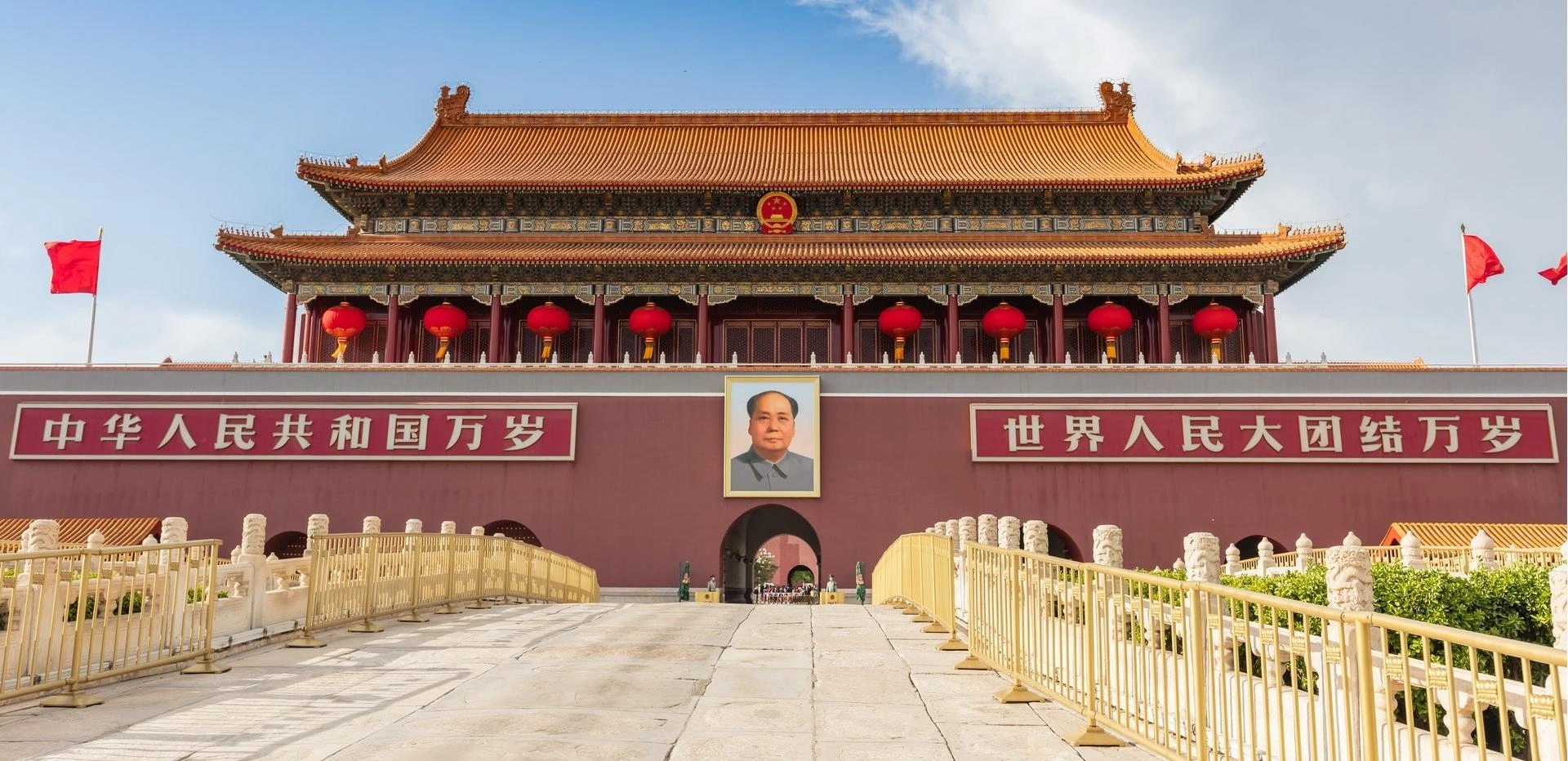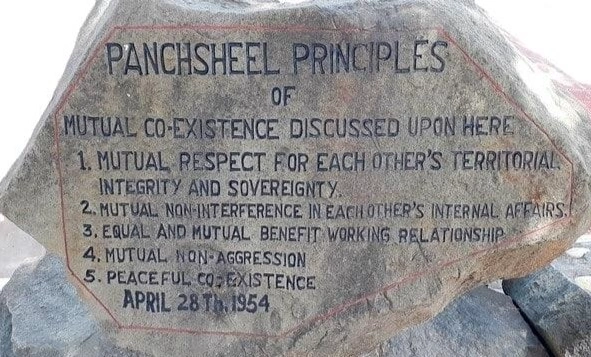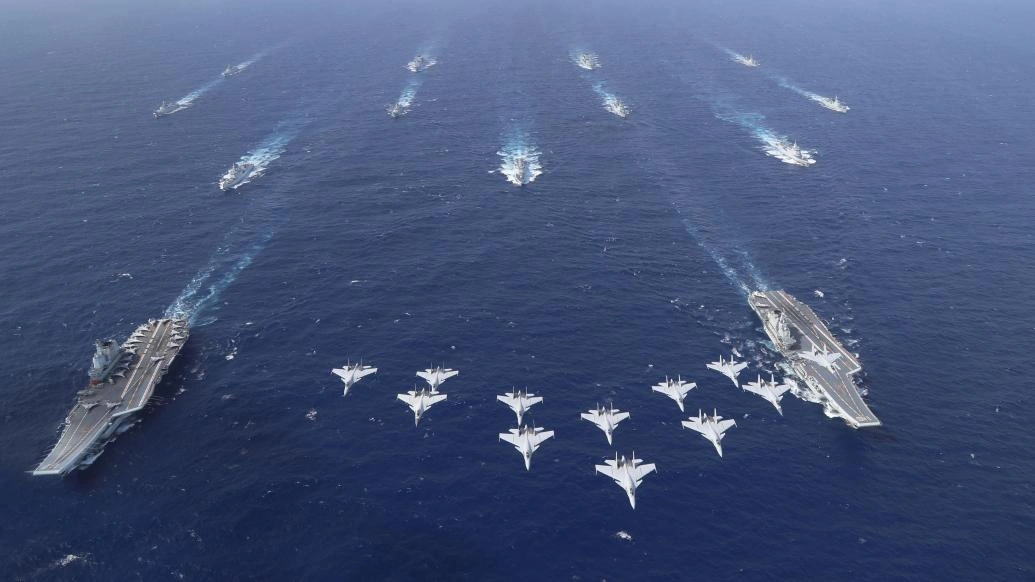Why Does China Never Want to Ally with Russia?
Many people have long been puzzled by a question: Why doesn’t China form an alliance? Simply put, China’s non-alignment strategy is the optimal choice derived from its historical context, current realities, and national conditions. It is, in essence, the most suitable foreign policy approach for China.
Historical Analysis
Many people lack understanding about China’s founding leaders. It is no exaggeration to say that the first-generation leadership of the People’s Republic of China ranks among the very best in the entirety of Chinese history. Their strategic vision and intellectual depth were so extraordinary that they far surpassed the comprehension of the average person.
 Zhou Enlai, Former Chinese Premier (Left 1); Liu Shaoqi, Former Chinese President (Left 2); Zhu De, Former Commander-in-Chief of the PLA (Left 3); Mao Zedong, Former Chinese President (Left 4)
Zhou Enlai, Former Chinese Premier (Left 1); Liu Shaoqi, Former Chinese President (Left 2); Zhu De, Former Commander-in-Chief of the PLA (Left 3); Mao Zedong, Former Chinese President (Left 4)
First, China’s founding leaders were individuals of great integrity and confidence. They firmly believed in China’s potential and were convinced that the country’s decline in the 1900s was only temporary. They were confident that, given time, China would rise again to become one of the world’s most powerful nations.
What was China’s situation in 1949? The country had endured a series of devastating wars, including the Opium Wars, the Jiawu War, the invasion by the Eight-Nation Alliance, and the Japanese invasion during World War II. These experiences left the Chinese people deeply unwilling to align themselves with Western powers, whom they saw as aggressors responsible for some of the greatest suffering in modern Chinese history.
Second, the founders of China had ideals. There are still two lines of characters hanging on Tiananmen Square in Beijing: Long live the People’s Republic of China! Long live the great unity of the people of the world! Many people in that era really wanted to liberate all mankind and regard the lower classes of the world as a community of interests. This kind of pure people disdain to engage in bloc confrontations, especially for some actions of the Soviet Union in the late 20th century, which they despised from the bottom of their hearts because it violated their ideals.

Therefore, in 1953, Premier Zhou Enlai explicitly articulated China’s foreign policy principles—the Five Principles of Peaceful Coexistence. This was a clear message to the world: China treats all nations as equals. China does not seek hegemony, nor does it engage in bloc confrontations. As long as you respect us and are willing to cooperate, our doors will always remain open to you.

This marked the beginning of China’s non-alignment policy, a stance that was firmly established from the outset. Subsequent events further solidified China’s resolve to avoid alliances. One pivotal moment was the fallout with the Soviet Union. After Nikita Khrushchev came to power, he demanded the establishment of a long-wave radio station and a joint fleet in China. This was, in essence, an attempt to control China’s sovereignty through a military alliance, effectively reducing China to a subordinate state.
This incident deeply impressed upon the Chinese people the risks associated with alliances—specifically, the potential compromise of sovereignty, which was fundamentally at odds with China’s core principles. After the Sino-Soviet split, China lost all interest in forming alliances, as the experience had starkly highlighted the dangers of ceding control over its own affairs.
Moreover, there were other bizarre incidents that further reinforced China’s stance.
For instance, China’s aid to Albania between 1954 and 1978 amounted to a staggering $10 billion, encompassing industrial equipment, food, military supplies, and more. Yet, what was the outcome? Albania’s leader, Enver Hoxha, repeatedly criticized China in public forums. Then, in 1978, when China had to halt its aid due to its own economic difficulties, Albania immediately turned its back on China, severing ties without hesitation.
Then there were the incidents involving Vietnam and Indonesia.
China had provided Indonesia with aid on multiple occasions, only to be met with dozens of anti-dumping investigations launched by Indonesia against China. Moreover, at the end of the 20th century, Indonesia was the site of the notorious “Black May” riots, during which the country’s Chinese community was targeted in violent attacks, resulting in significant casualties.
As for Vietnam, the situation was even more egregious. China had supplied Vietnam with weapons and food, aiding them in their fight against American forces. However, Vietnam later turned around and used the very resources provided by China to launch an invasion against China. This betrayal ultimately led to the Sino-Vietnamese War, a conflict China was forced into in self-defense.
The Chinese people witnessed all these events unfold, and they learned a profound lesson: when you are weak, having numerous allies is meaningless. Others can betray you at any moment for their own interests. Moreover, the enormous costs of maintaining these so-called friendly relationships can severely burden the domestic economy.
Realistic Analysis
Why is China reluctant to form alliance treaties with other countries? Take Sino-Russian relations as an example. If China and Russia were military allies, the moment the Russia-Ukraine conflict broke out, China would be obligated to send troops to Ukraine. What kind of chain reaction would this trigger?
First, China’s military spending would skyrocket, with hundreds of billions of dollars annually diverted to supporting military operations abroad rather than being invested in domestic industrial upgrades and scientific research.
Second, once China intervened in the Russia-Ukraine conflict, there would be no room for reconciliation with the European Union (EU). Recent tensions between the EU and the United States have shown that the EU is a potential partner China can engage with. The China-Europe Railway, for instance, generates significant profits and orders for China every year. Would it be worth completely alienating the EU for the sake of Russia?
 During U.S. Vice President J.D. Vance’s speech at the Munich Security Conference, he stunned the world with sharp criticism of European countries on issues of free speech and immigration policies.
During U.S. Vice President J.D. Vance’s speech at the Munich Security Conference, he stunned the world with sharp criticism of European countries on issues of free speech and immigration policies.
Third, alliance commitments could drag China into military conflicts against its will, disrupting its domestic industrial upgrading and strategic planning. Additionally, when the Russia-Ukraine conflict first erupted in 2022, global public opinion largely labeled Russia as the aggressor. If China had directly intervened to support Russia under such circumstances, how would the international community have perceived and judged this action?
Some might argue that public opinion doesn’t matter and that strength is what truly counts. However, as an ancient Chinese saying goes, “Justification is crucial when taking action.” Moral legitimacy is of utmost importance. If China were dragged into the conflict by Russia, the likely outcome would be widespread Western sanctions and embargoes against China. What would become of initiatives like the Belt and Road and China’s industrial upgrading under such circumstances?
Therefore, to maintain strategic autonomy and avoid being derailed by unexpected “black swan” events that could disrupt its global plans, China’s adoption of a non-alignment strategy is not only wise but necessary.
Especially after World War II, the world learned a crucial lesson: in times of global chaos, the later a nation enters the fray, the greater the benefits it reaps.
This is because the division of post-war spoils isn’t based on your contributions during the conflict, but rather on your strength at the war’s conclusion. Therefore, during times of turmoil, it’s best to avoid involvement if possible. Wait until all parties are exhausted, then step in to mediate and assert influence. That’s when your voice carries the most weight. This is precisely how the United States rose to prominence after World War II.
Understanding this makes it clear why both Ukraine and the United States have been eager to draw China into the Russia-Ukraine conflict. In fact, their goal is to forcibly deplete China’s strength. However, China has long seen through their intentions, which is why it has consistently refused to get involved.
Just imagine: if China and Russia were allies, would there be any room for strategic flexibility? None. The moment Russia launched its special military operation, China would have been forced to go all in. Now, do you understand the importance of maintaining a non-alignment strategy?
Analysis Of China’s National Conditions
There’s one thing that sets the Chinese apart from people in virtually every other country: their perception of foreigners. For instance, if a Japanese person encounters a Westerner on the street, they might wonder whether the person is American, French, or Italian. But for most Chinese, the world is divided into just two categories: Chinese and foreigners.
So, if you observe closely, you’ll notice that when it comes to industrial upgrading, the Chinese benchmark themselves against the entire world.
In automobiles, they aim to surpass Germany and Japan. In aviation, they set their sights directly on the United States. In shipbuilding, they strive to secure three times the orders of South Korea. In semiconductor lithography, they target ASML of the Netherlands.
The same goes for tunnel boring machines, high-speed rail technology, grain production, renewable energy technology, power generation, and more. The Chinese aspire to be number one in every field. In the minds of many Chinese, the world is divided into just two categories: China and the rest. Whatever other countries excel at, China is determined to learn and master. This mindset is deeply ingrained in the Chinese psyche and is a cornerstone of the nation’s founding principles.
This phenomenon can be attributed to two main reasons:
First, China’s population is enormous—1.4 billion people, more than the combined populations of Europe and the United States. Second, China is the only ancient civilization that has never been interrupted. For over 2,000 years, China has consistently ranked among the world’s strongest, or close to it. This historical legacy has instilled in the Chinese people the confidence to strive for global leadership in every industry.
It is based on these realities that, from the very founding of the People’s Republic of China, the nation prepared itself to stand against the entire world. This isn’t self-praise or exaggeration—it’s historical fact.
First, China defied the U.S.-led coalition of 16 nations during the Korean War. Then, it decisively defeated India, then a major power in the Third World. Later, it repelled the Soviet Union at Zhenbao Island and dealt a blow to Vietnam, the self-proclaimed “hegemon” of Southeast Asia.
It is no exaggeration to say that the People’s Republic of China is the only country in the world that has simultaneously confronted all five permanent members of the United Nations Security Council and fought against two superpowers. Due to the extremely hostile international environment, China, from its very inception, designed its entire industrial chain and grassroots organizational structure to be prepared for the possibility of a global conflict at any moment.
The best example of this preparedness is the COVID-19 pandemic in 2020. Amid an unprecedented crisis, China demonstrated its ability to lock down a megacity with a population of over 10 million, seal off an entire province of more than 50 million people, and mobilize its 1.4 billion citizens into an orderly “wartime state.” This itself is a testament to the nation’s comprehensive readiness for large-scale emergencies.
 During the COVID-19 pandemic in 2020, China built the Huoshenshan and Leishenshan hospitals in Wuhan, capable of providing over 2,000 beds, in just 10 days.
During the COVID-19 pandemic in 2020, China built the Huoshenshan and Leishenshan hospitals in Wuhan, capable of providing over 2,000 beds, in just 10 days.
At that time, Western media commented that China was always prepared for a large-scale, full-scale war—and indeed, it possessed the capability to do so.
If you still don’t understand why China doesn’t form an alliance after reading all of this, just think about it: When a country has over 100 million military reservists, a complete industrial chain spanning every sector, the most formidable grassroots organizational capabilities in the world, and top-tier military technology across land, sea, and air—does having allies really matter all that much?
 In October 2024, the Chinese Navy held its first dual-carrier formation exercise in the South China Sea.
In October 2024, the Chinese Navy held its first dual-carrier formation exercise in the South China Sea.
It’s like how people interact: when you’re weak, you might go out of your way to please others and build relationships, only to be met with disdain or indifference. But when you’re strong, even if you stay at home, a crowd will gather around you, eager to build connections. This is the reality of human relationships, the reality of international relations, and the fundamental reason behind China’s non-alignment strategy.
Editor: Chang Zhangjin





Anonymous
中国人因有自豪的文明而团结在一起,因为团结,又会促使文明更加强大,这就是良性循环
Ecuanimidad2024 mara
China un gran país, una nación orgullosa de si, una nación q necesitamos lidere el futuro.
Anonymous
Very good and instructive resumée! Pax sinica! Greetings from Brazil!
NotChasing
I was a teenager when I first read a popular English poem, Desiderata, which warns “If you compare yourself to others, you may become vain or bitter.” I’ve tried to take that warning to heart, because I’ve noticed in my own life that trying to be the best at things is a hollow kind of striving.
Anonymous
Excellent. Truly clarifies my understanding of the Chinese global position. Thank you.